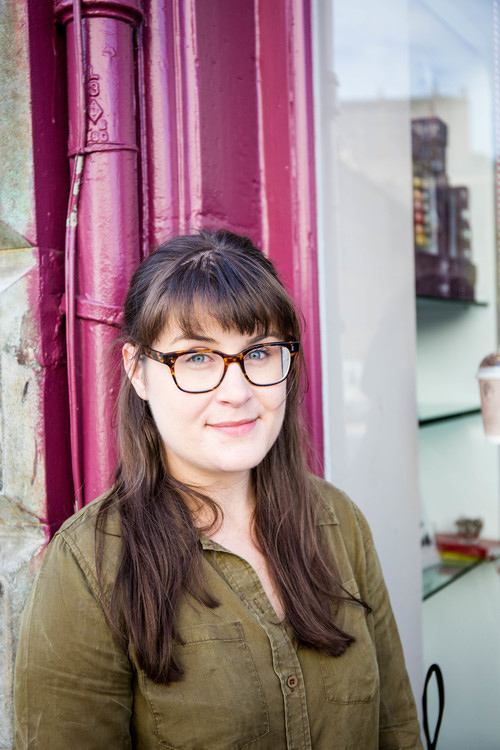


Many businesses and their staff have felt the impacts of coronavirus pandemic. Thanks to the UK Government’s business support schemes, employers have kept afloat during the storm.

It was particularly challenging to keep Macaron, a French chewy-melty little almond confection fresh and relevant throughout lockdown. This patisserie owner reveals how they coped.
Rachel Hanretty, of Mademoiselle Macaron, fell in love with macarons while living in Paris. She enrolled at the Alain Ducasse cookery school to learn how to make macarons.
“They’re just so pretty,” she says. “They’re so delicate. And they’re quite hard to make because there’s a lot that can go wrong.”
Once Rachel returned to Edinburgh and noticed a gap in the market, she decided to set up her very own macaron business. “I wanted to have that little bit of Paris with me,” she says. “I focused on taste-bud tourism, so when you eat these macarons you’re transported to the Champs-Élysées.”
Rachael opened her store after nine months of trading from home and going to food markets. “It was in the centre of Edinburgh, it had a view of the castle. It was beautiful,” she says.
Since launching online in 2015, the business could send macarons, servicing wholesale and wedding customers across the country. “If lockdown has taught us anything, it’s that bricks and mortar make you vulnerable,” she adds.
The company, which employs eight people, lost all their wholesale customers overnight due to Coronavirus. “It was really scary,” she says. “All the weddings, all the wholesale customers, and the bulk of our production disappeared. And then, of course, you have phone calls from people wanting to cancel future orders and refunds. We entered the cash flow situation whereby the wholesale customers stopped paying the invoices. And we’ve now got over £30,000 worth of overdue invoices.”
The doom and gloom is over, as Mademoiselle Macaron has started to see an increase in online orders.
“We still have that debt from the large companies, and they don’t seem to be interested in addressing it anytime soon,” Rachel says. “It’s 120 days overdue. But we have an increase in online sales. It’s really interesting.”
Rachel continued; her biggest fear was; “The unpaid debt and whether or not they would really ever be able to pay it back.”
Kudos to the UK Government’s furlough scheme, her business has kept afloat. “The furlough scheme has been a real lifeline in this time of crisis,” she says. “I asked people to volunteer for furlough. So the people who wanted to and were happy to, they were the first ones to go. I cried.”
The fear and anxiety of staff associated with financial loss was dampened with their understanding being furloughed as it helped their mental health.
“I just felt like I was stuck in this moral quandary,” she says. “Do we keep going and safeguard the business, so there’s a business for everyone to come back to? Or do I shut down because I can see that this is causing people severe anguish?”
Running the business with six out of the eight staff furloughed for six weeks was an additional challenge but the fact that macarons can be frozen really helped. “We managed to recall stock that was sitting in hospitality clients freezers. That is the only reason we survived. What you make, you keep in the freezer and you use when you need to. It’s not like it’s a cupcake, if we were perishable goods we would never have survived or scaled up to where we are.”
“The furlough scheme let us preserve the team, and the business. But now, for me, the big test is: how do we keep this level of orders online?”
Operational flexibility is key to running a small business especially as you’re reliant on outside funding. Now everyone is back at work at Mademoiselle Macaron, they’ve had to be creative in terms of changing shift patterns and splitting the team in half, so there’s less contact. “We have a big kitchen so the space isn’t the issue. It’s more that we wanted to keep the team safe,” adds Rachel.
Rachel would like to help younger people by developing a training program with a college. “They’ve been so much more affected, and it’s just something close to my heart,” she says. “All the graduate positions I applied to when I finished university basically told us that because of the impact of the financial crash, they would never take on as many graduates than they used to.
“I feel that the business is now emerging from a different global crisis.” With everyone eager to be free from ‘The Great Confinement’ and be transported to somewhere else. Dinky French-style almond macarons can be at the very top of the shopping list.
To check whether you are eligible for business support, visit: www.gov.uk/business-coronavirus-support-finder
This advertiser content was paid for by the UK Government. All together is a UK Government backed initiative tasked with informing the UK about the Covid-19 pandemic. For more information visit gov.uk/coronavirus.

Kindly follow us on twitter:@AfricanVoice2










